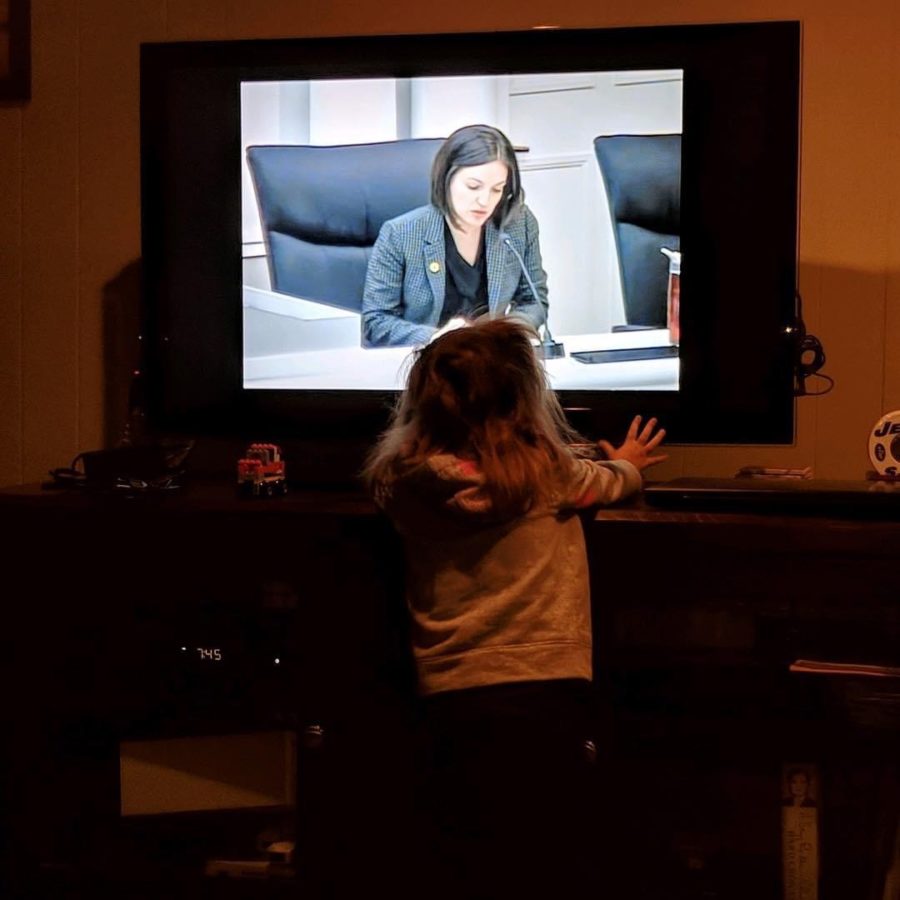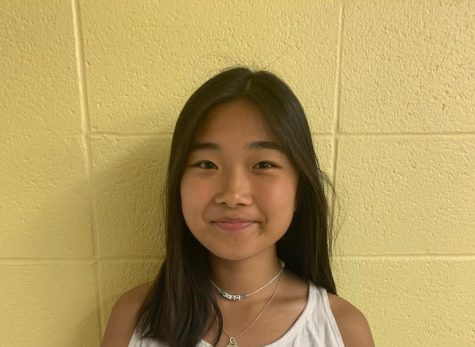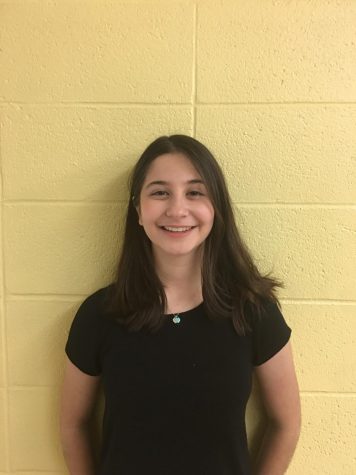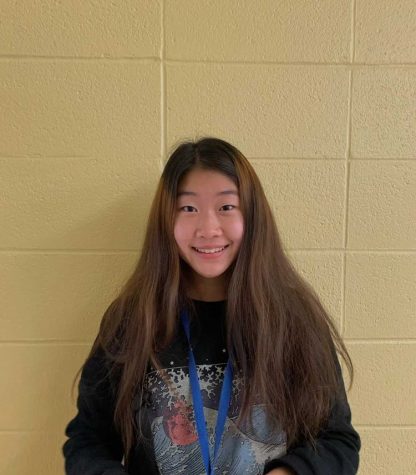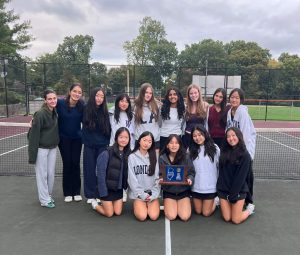Celebrating Women’s History Month 2021: The Stories of Our THS Teachers
March 26, 2021
March marks Women’s History Month, a time when we can celebrate the accomplishments of women throughout history and in contemporary society. To commemorate our wonderful women teachers at THS, we asked a couple of them to share their experiences and identities as women.
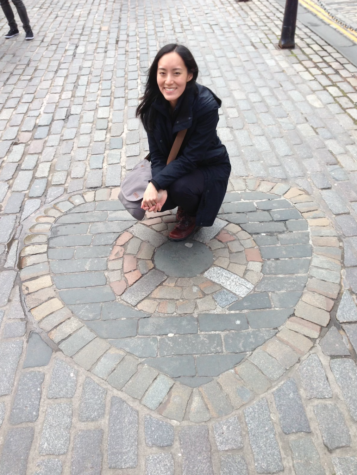
Mrs. Oppedisano is best-known for teaching the English portion of the notorious yet beloved Sophomore Humanities class, as well as for her cats and whimsical personality. She said that Women’s History Month “provide[s] that space to reflect on how people have contributed to the ongoing work of progress…but because that work is ongoing, it doesn’t have to be limited to the focus of a single month.”
For instance, the gaming world is predominantly dominated by male players. “In the early days of playing a game called Overwatch,” Mrs. O said, “I would sometimes encounter players who were surprised to hear a female voice over the team voice chat…there’d be this feeling of ‘Ok, so how much do I have to prove, and can we just focus on the objective instead?’” However, she mentioned that “these days, I’m lucky to have friends I can game with, and I’m especially fortunate to be married to someone who loves gaming as well.”
She has been teaching for 15 years now and says that “the moments that save me from becoming a curmudgeon are ones where we can have refreshing discussions in class. I really appreciate those days when I get to see people being honest or frank enough to rant or rave about a subject, to have the passion to care about something…Literature can make us feel less alone when it comes to our experiences or emotions or perspectives.”

She talked about how she has maintained two friendships since before kindergarten: “I’d say that one of my greatest accomplishments was simply learning to understand who I truly wanted to keep in my life, after all the wear and tear of time.” One spring, she and Mr. Oppedisano spent their time befriending a chipmunk. “Eventually, it would be waiting for us when we got home from school each day,” she said. “Having a chipmunk take an almond from my hand felt like the pinnacle of success.” She also finally got around to finishing the book Infinite Jest by David Foster Wallace: “It’s the kind of book that rewards you for paying attention.”
Lastly, she left some advice for aspiring female writers: “I suppose my one piece of advice is to just write–pay attention to the world, to your thoughts, to why you perceive things the way you do.”
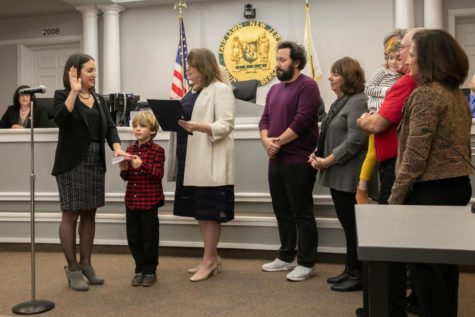
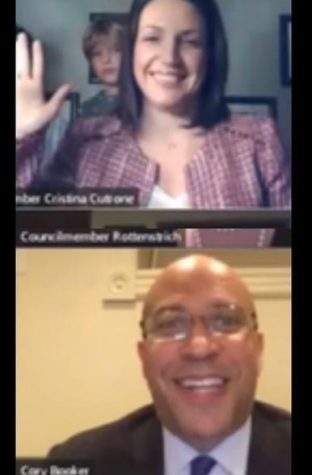
Ms. Cutrone, a THS history teacher, also serves as Fair Lawn’s Deputy Mayor. Elected to the town council in 2018, Ms. Cutrone was selected by her council colleagues to be Deputy Mayor this past January. “I truly believe that women, like myself, innately possess a lot of the skills good leaders need. For example, women are often the consensus builders in the room, they are effective communicators, they are community-oriented, persistent, well-prepared, compassionate, and empathetic,” said Ms. Cutrone. “I rely on these strengths in my classroom and in my role as the Deputy Mayor, and I believe it is what makes me effective in both of those roles.” Ms. Cutrone said that the most important thing about Women’s History Month, much like Black History Month, is that it reminds us all that representation matters. She quoted Marian Wright Edelman who famously said, “you can’t be what you can’t see” and added, “Taking time to acknowledge female leaders and female accomplishments in all areas is so important because it will show the next generation that they should not feel limited based on their gender.”
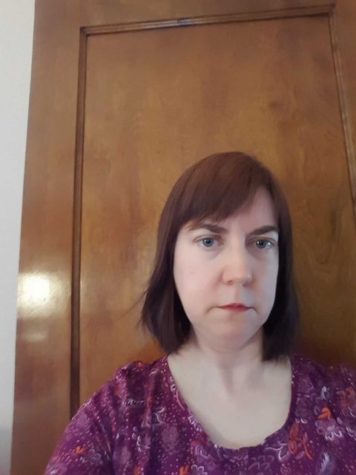
Ms. Bossong, a former research chemist from the pharmaceutical and medical industry, has been teaching science for many years. She has a genuine passion in teaching her students, which is conveyed through her favorite part about being an educator. “My favorite part is interacting with the students.” While she is inhibited by the technological substitutes for teaching during COVID-19, she is “trying to at least come close to the in class ‘give and take’ that usually exists.” She says that “it is the interaction that brings out the “aha!” moments when a student suddenly gets the bigger idea of a concept” that makes it all worth it.
She believes Women’s History Month is very important to recognize because “traditionally, history has written about male leaders in all fields, [and] the work of women has often been downplayed.” Especially in science, women have a history of not been getting enough recognition for their works. “For example, Rosalind Franklin was a chemist and x-ray crystallographer, who worked on the x-ray diffraction images that led to the discovery of the structure of DNA. She was never acknowledged in her lifetime, although Francis Crick, James Watson, and Maurice Wilkins (who was her graduate students) were awarded the Nobel Prize in 1962.”
In Ms. Bossong’s family’s culture and tradition, (part-Celtic), “it is expected that the women are just as smart, strong and important as the men.” But this does not mean she wasn’t faced with any outside challenges while working in science. Being in a very male-dominated field, “it was necessary for women scientists to work harder to prove themselves in order to compete against the men in the lab.” At some times, being a woman in the lab even caused her to have encounters with colleagues “who would state their negative thoughts of women in the lab verbally.” Luckily enough, for her first job in the pharmaceutical industry, she was hired by a woman PhD. She “acted as a mentor in how to deal with these attitudes, as she had dealt with them her whole career as well.”
Upon her greatest accomplishments, she is heartwarmingly proud of her students. “I have many who have already started careers in science and medicine, but I am equally proud of those in other fields who took the lessons I tried to teach about logic and reasoning and applied them to other areas.” In light of the pandemic, there is a great need for scientists, and she does hope that some of her work from her old research would have been applied to Covid-19 treatment, for “one area was being studied as a treatment for the inflammatory syndrome seen in severe cases.”
Lastly, she advises any future women scientists and students, “to be confident in your skills, but always willing to learn from those more experienced.” With empowering words, she motivates students to “Stay focused on your goal and put your full strength into achieving it. Never let anyone make you feel inferior, no one has the power to take your ability or worth away from you.”
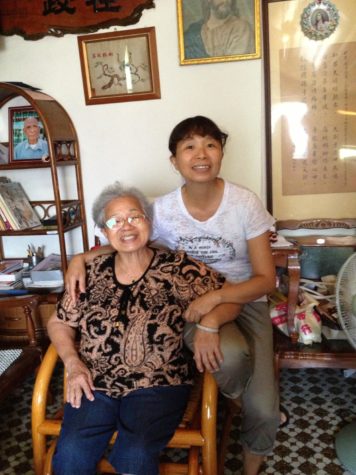
Mrs. Sung, THS’ one and only Chinese teacher, shared how her experiences growing up in Taiwan have especially shaped her identity as a woman today. She shared that as a child, she never thought that there were boundaries for women because her father treated her whole family as equal. Mrs. Sung recalled that when Tsai Ing-wen, the first woman president of Taiwan, was elected after 50 years of marital law in Taiwan. This kind of representation influenced not only her, but almost all of Taiwanese women, as being able to witness a woman in such a role of leadership further proved that women can do just as well as men in certain professional fields. “The value system as women shows us that we can do anything if we try hard enough,” Mrs. Sung said. “I never thought I would be a high school language teacher, but anything is possible if you work hard enough.”
When she moved to the United States, Mrs. Sung held the words of her mother close to her heart. “My whole life is influenced a lot by my mom,” said Mrs. Sung. Mrs. Sung’s mother was educated under the Japanese when they invaded Taiwan and went to school up to 6th grade. She became the second wife of Mrs. Sung’s father when she was only 19. “My mother always told me that women are seeds. The wind blows them in whatever direction, but no matter what environment they find themselves in, they have to adapt no matter how hard it is,” Mrs. Sung said. “‘You will survive, you will survive’ she always told me. This has become my mantra.” Mrs. Sung also added that, although her mother wasn’t highly educated, she was strong, smart, and most importantly had a sense of humor. “She told me that even when life is hard, use the funny and light things to light up your life.”
Mrs. Sung shared that she feels lucky that her husband loves to cook and help out around the house so that she can focus on her teaching. “Sometimes I bring my teacher character to my home,” she said. “Sometimes my kids will tell me to stop talking to them like they’re my students and sometimes I may mix my identities as a mother and teacher, but there is no reason I can’t be both.” Lastly, Mrs. Sung feels blessed to be a teacher in the language field, though she doesn’t want to just be a teacher of languages but also one of values: “I want to help my students become whole and positive individuals.”
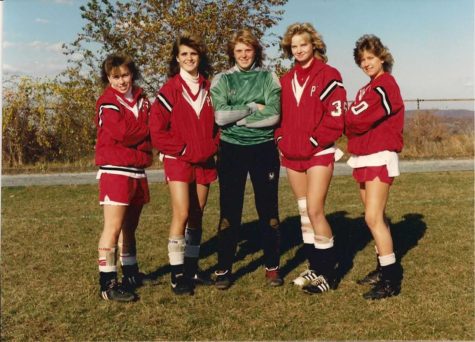
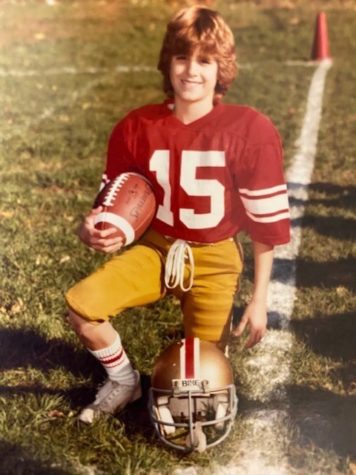
Ms. Salamone has been working at Tenafly High School since 2008, as a Physical Education/ Health teacher. She thinks Women’s History Month is “a wonderful tribute to all the women before us who have paved the way and continue to set the tone for the next generations to come.” Being a physical education teacher, coach, and former athlete, she also thinks of “Title IX” upon thinking of Women’s History Month, which “is the only law that has granted women more opportunities to pursue a career in sports and allow for other professional opportunities.” She still believes there is a long way to go, for there have been many obstacles in this struggle for equality. “The NCAA Tournament has shown inequality between the men’s and women’s facilities,” she said, and the disparities still “continue to surface as women in professional sports such as WNBA and NWSL battle for equality and fair pay.”
But the constant struggle for equality has not been in vain, for society has been opening more opportunities for women, such as how “Sarah Thomas made history as being the first woman to officiate the Super Bowl,” and was also “the first full-time female referee in the NFL.”
Growing up, Ms. Salamone had to overcome many struggles and challenges just in her family, and was a pioneer, for she never wanted to conform to her environment. Coming from a “long line of old-school Sicilian traditions where gender roles were stereotypical,” she was expected to conform to societal expectations. “Women were homemakers, men were breadwinners,” she said. “I was always going against the grain trying to convince certain family members that I could do what boys could do.” She dealt with many different circumstances where she questioned why she was stuck with domesticated roles, where the men in her family were outside physically working. It became a “constant battle with [her] grandmothers,” since she was the “only granddaughter out of seven grandchildren.” Wanting to be treated equally, even as a child, she was “always competing with the boys,” and “always had to prove that [she] was strong and tough enough both physically and mentally.”
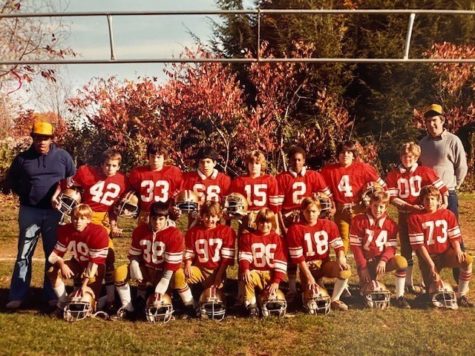
She played sports, not only because she loved it, but also because they were her personal form of catharsis and outlet through perseverance. “I had to prove to others that I was just as good, if not better than some of the boys I competed with and against,” Salamone said. Reminiscing on her childhood, she remembers, “playing pick-up games with our neighborhood friends until the street lights came on.” Because “No one wanted a girl on their team,” she played sports with her older brother and his friends. She would not back down and going against the norm of girls, she spent her time “impersonating and re-enacting WWF wrestlers, or playing tackle football, pick-up or street games.”
She started to break barriers when she “had to convince [her] parents to let [her] play organized town football in an all-boys league.” She quickly became “the talk of the town,” and while her parents were supportive, many were hesitant, boys were intimidated, and there was an air of uncertainty. “There was no place for a girl on a football team,” people had criticized. She became the “only girl playing little league,” and even “ignited the fire for [her] church to have a girls CYO (Catholic Youth Organization) basketball team.”
These years of perseverance and determination were not in vain. “In 1982 I was the first female to play football for the Portland Dukes,” Salamone said. In her tenure, she has also “played various positions, such as quarterback, running back, offensive end, and defensive safety.” Not only limited to football, she “was also the first female to play little league baseball.” These were both done at young ages, for she was also only 11 years old, when she played football. Although she did feel the need to “prove herself to the majority,” she was an extremely advanced player, and her “level of play and athleticism spoke for itself.”
“Not to brag, but I was good at it!” she said. After everything she had been through, her “teammates treated [her] as their equal,” and that was “all [she] wanted.” They cultivated a feeling of mutual respect. “I was able to take advantage of those and reach the next level as I was recruited to play soccer and basketball at the collegiate level,” she said. Salamone had to endure many obstacles to get to her position. “Hard work and perseverance afforded me the opportunity to get a college education,” she said, and “the obstacles that I overcame in my youth pushed me to stand out and fit in amongst the boys.” Salamone is extremely proud of her accomplishments, and everything she had to go through to attain them.
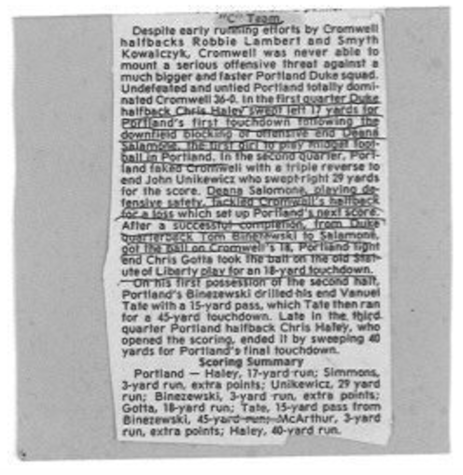
Her last piece of advice to aspiring females is: “you won’t know until you try,” for “Hindsight is 20/20!” Although she broke the status quo, played sports, and “was the first female to play on ‘all boys’ teams,” she was “still hesitant and fearful of the unknown.” Despite her fears about not being accepted, or not being taken seriously, she was “confident enough to try and was serious about playing.” She hopes that this Women’s History Month will “help build self-esteem, confidence, and assurance for women to be assertive in their endeavors and to never give up.”
Women’s History Month is a time to honor the accomplishments of women who have shaped our lives. Yet, we should all take time every day to thank women and to hear their stories.











































































































































